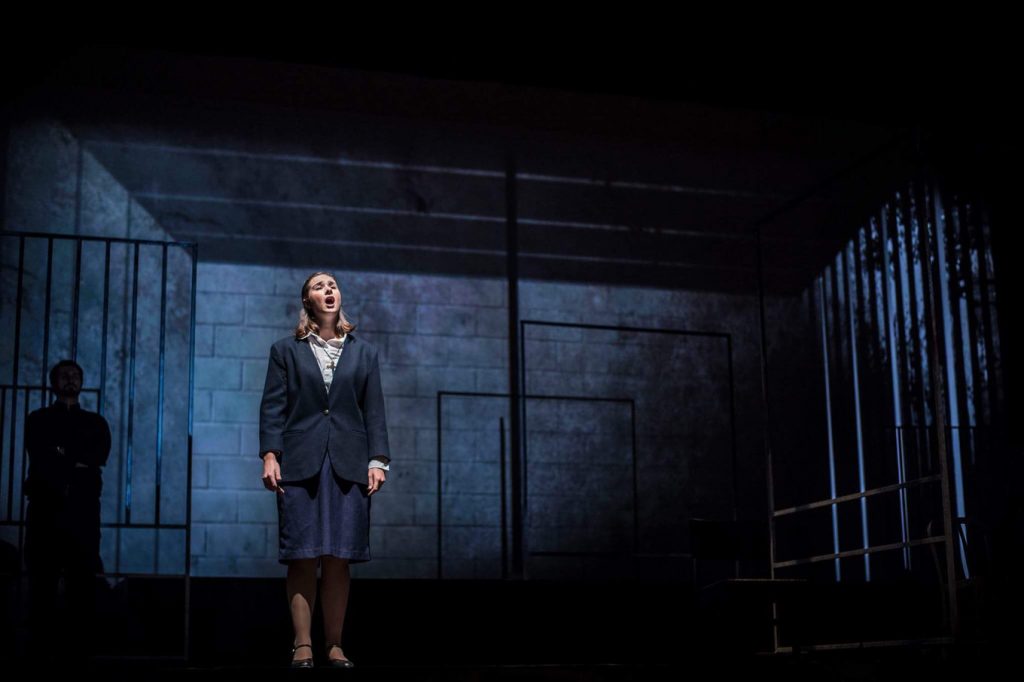
By Dennis D. Rooney
The composer Jake Heggie was born John Stephen Heggie on March 31, 1961, in West Palm Beach, but didn’t stay there long as his family relocated soon after his birth to Columbus, Ohio. Since the late 1990s he has been identified with the musical scene in San Francisco, where he currently resides.
He composed Dead Man Walking through a fellowship from the San Francisco Opera, collaborating with librettist Terrence McNally in an operatic adaptation of the book of the same name by Sister Helen Prejean, published in 1993, which was followed by a film adaptation in 1995 with the same title.
Heggie’s opera had its first performance at the San Francisco Opera in 2000. During the ensuing years, it has been heard internationally and has logged more than 300 performances, including by the Washington National Opera earlier this year.
The production last week at the Miami Music Festival was the work’s Florida premiere. In two acts, it took somewhat more than two hours to play. The subject is capital punishment, specifically lethal injection, with accompanying issues of acknowledging guilt, repentance, and the unyielding desire for vengeance of the victims’ survivors. Some (myself included) are not persuaded that these subjects lend themselves to successful operatic treatment, and the performance I heard did nothing to change my mind.
The harrowing and grim subject matter was intensified by playing against a rear-projected scrim downstage, with a few properties used to suggest variously an automobile, prison bars, a meeting room and the execution chamber. The orchestra, conducted by Bradley Moore, played on the floor in front of the stage. As a preamble, the murder of the two teenagers that led to a death sentence for Joseph De Rocher (baritone Eric Vinas) was portrayed unfortunately rather ineptly due to some flubbed sound effects and lighting so dim that the action was hard to perceive.
De Rocher’s request that Sister Helen Prejean, a nun of the Sisters of Saint Joseph of Medaille, become his spiritual adviser, is discussed as Act One opens. Sister Helen (mezzo-soprano Kaitlyn McMonigle) first leads some schoolchildren in song; she and two colleague sisters then discuss her uncertainty about how to respond.
The remainder of the act is taken up with Sister Helen’s journey to the Louisiana Death House, her first encounter with De Rocher, a confrontation with the aggrieved parents of their victim children, a scene with De Rocher and his mother (mezzo-soprano Pauline Tamale), an unsuccessful appeal for clemency and the confirmation of the death sentence.
Act Two takes place for the most part on the night of De Rocher’s execution. A shared appreciation of Elvis Presley is the catalyst that enables meaningful communication between them, interrupted by the arrival of his mother and younger siblings. After a tearful farewell scene, followed by another acrimonious encounter between Sister Helen and the victims’ parents, comes the emotional climax, when De Rocher finally admits his guilt to Sister Helen, who assures him of divine forgiveness.
The final scene begins as the Warden (baritone Marcus Schenck) pronounces “Dead man walking,” a once-traditional notification that a condemned prisoner was walking from his cell on Death Row to the place of execution. After an affectionate farewell, Sister Helen takes her place among the spectators viewing the process of lethal injection, which concludes in a darkened house with the steady tone of a heart monitor breaking the silence.
Heggie has written extensively for the voice: songs and choral works in addition to his operas. But I heard no suggestion of any marked affinity for the voice in his writing for it. There were attempts at traditional operatic scenes and ensembles. The two scenes with De Rocher’s mother seemed most successful. Sister Helen and Sister Rose (Naomi Worley) have a scene in Act Two that promised more than it could deliver. The ensembles lacked impact because the singing had no dimension or color; it was all undifferentiatedly loud.
McMonigle and Vinas had a lot to sing and were onstage much of the time, but both had a doggedness that militated against expressiveness or subtlety. None of the singers rose above the regionally workmanlike. Some scenes were separated by orchestral interludes that did not suggest either plot or character development. The mood throughout was overwrought and hectoring, constantly underlined by the tendency of all the performers, voices and orchestra alike, to sing and play at full volume all the time. The room acoustics doubtless played a part, but dynamics are still essential in music and they were woefully undervalued.